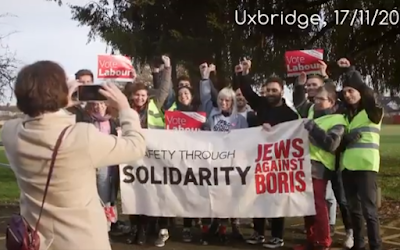Primo Levi, Zionist
The influential philosopher and fanatical Israel-hater Judith Butler has favorably cited Primo Levi’s public criticism of the Jewish state’s war in Lebanon in the early 1980s to make him into a literary saint of anti-Zionism. But such a reading of the Italian-Jewish novelist and Holocaust memoirist requires ignoring what he had earlier written on the subject, explains Alvin Rosenfeld. Levi’s first encounters with Zionism came in Auschwitz, and later with the Jews he met while wandering Eastern Europe after the war:Why I’m coming home to Israel
[When] Levi first came to know young Zionists [he] was fascinated by them, so much so that he devoted an entire novel, Se non ora, quando? (If Not Now, When?) to telling their story. His narrative follows the exploits and wanderings of a small group of young Jewish partisans, who during the war lived in the forests and fought the Nazis and their allies. Following war’s end, they were determined to get away “from this Europe of graves” and make their way to the Land of Israel, where they would be “men among men” and work to reclaim “the honor of our submerged people.”
In addition, writes Rosenfeld, Levi was disturbed by the emergence of anti-Semitism in the form of anti-Zionism after World War II. In particular, like a number of other Europeans of the left at that time, he spoke in defense of Israel on the eve of the Six-Day War:
On May 31, 1967, . . . Levi gave a speech in the main synagogue of Turin, his native city, which was soon afterward published under the title “More than Any Other Country Israel Must Live.” . . . No other country, [Levi declared], is asked “to cease to exist,” but precisely such an end was being envisioned for Israel. Moreover, with Egypt in the lead, several Arab armies were preparing for the country’s liquidation. Levi’s response was that Israel “must survive.”
Why? Because, like every other country, “it has the right to live,” but, beyond this reason, “everyone should remember that the generation that created Israel consists almost entirely of people who escaped the massacre of Judaism in Europe. . . . For this reason, I say, Israel is not like other countries; it is a country to which the whole world is indebted, it is a country of witnesses and martyrs, of the insurgents of Warsaw, of Sobibór, and of Treblinka.”
Levi saw “the relationship of every Jew, even if he is not a Zionist, to the state of Israel [as] obvious and profound.”
I was born in Alexandria, Egypt in 1933 into an educated middle-class Jewish family of mixed ethnic origins. My mother descended from a prominent Sephardic family that had settled a few generations ago in Jerusalem; my father was an Ashkenazi Jew from Kiev, Ukraine, who spoke 10 languages perfectly well and made aliyah in 1924. My parents were married in Tel Aviv in 1925 and moved to Alexandria in 1926 to be with one of my mother’s brothers. There was a cultured European atmosphere in Alexandria at the time. A dozen languages were heard in the streets. While I was growing up, we enjoyed going to operas, concerts, and ballets performed by Europeans companies; we spoke Hebrew and French at home.
Despite the many golden memories which some former Egyptian Jews have of their life in Egypt, the relationship between the 80,000-strong Egyptian Jewish community and the Muslim majority during the 1930s and ‘40s was tenuous at best, even prior to the 1948 Arab-Israeli war. Under the influence of Hadj Amin el-Husseini, the Grand Mufti of Jerusalem, the Egyptians hoped the Nazis would win World War II. Antisemitism, a defining characteristic of the theocratic Arab countries, was on the rise in Egypt under the influence of the Islamic revivalist Muslim Brotherhood. It reached one of its many convulsive climaxes on May 15, 1948, when seven Arab countries invaded the newly created State of Israel. My father was taken by the Egyptian police at dawn and interned at Abukir, one of four camps erected at the time to intern Zionists and communists. He stayed there for nearly a year until the police took him straight to the airport, where he was forcibly expelled from Egypt, never to return. My mother and I joined him with just three suitcases containing all our lifelong belongings.
Thus our saga as “refugees” began. Alongside 850,000 Jews from Arab lands who were forced to leave their homes, my family and I were accepted in the new State of Israel. After over 2,000 years of persecution and exile, the Jewish people had a country where they could freely practice their faith, share their culture, and speak their indigenous language. On becoming Israeli citizens, the State of Israel utilized my father’s linguistic abilities and sent him all over the world to publicize Israel’s needs through the newly created Israel Bonds. For 20 years, my father traveled to Latin America, where he spoke Spanish and Portuguese, and to Europe, where he spoke fluent French, German, and English.
The road between Saudi Arabia and Israel passes through Al-Aqsa
Realism means acknowledging that no Arab state in its present form existed before Israel did, and that its independence preceded that of most Arab countries. Jordan has failed to administer this holy site properly, to develop it and turn it into an attractive site for religious tourism, peace, and tolerance, rather than a platform for hatred. It is time for it to be under Saudi administration, managed along with the Two Holy Mosques in Mecca and Medina. Saudi Arabia has great ideas for the Temple Mount, to turn it into a tourist landmark and a center of peace and love, to connect these holy places – Mecca, Medina, and the Al-Aqsa Mosque – by train, so that pilgrims, visitors, and tourists can visit them all in one day, thereby developing economic and employment opportunities on all sides.
Arab, and particularly Saudi, public opinion today no longer rejects peace or the multifaceted evolution of ideas, and has begun to see peace without preconditions as the best option for development and success. If we consider the recent move of the US Embassy from Tel Aviv to Jerusalem, we see that the Arabs did not go out to protest or condemn it. This shows that Arab public opinion has changed towards the Palestinian issue and has begun to acknowledge Israel and its right to exist. Peace between the Arabs and Israel will also check Iran and the terrorist organizations that are devastating the Arab world, shattering the dreams of millions and rendering millions more homeless.
As Saudis, we feel gratitude towards Israel, which has shown itself to behave particularly honorably toward Saudi Arabia during critical moments of public agitation against the Kingdom over Khashoggi and other issues. Israel’s position was also much better than that of Arab countries when Iran struck Aramco, and Israel remains ready to confront Iran alongside Saudi Arabia. These are all positions that demonstrate to us that Israel today is a friendly country and no longer an enemy state.
Sometimes, we need to move beyond our pain and put an end to futile wars and hatreds that, unchecked, could continue for generations to come. Today we find ourselves at a moment in history when we can achieve peace, especially with a leader as great as Muhammad bin Salman, someone who will continue to be an outstanding historic figure for a long time to come. He is the one person capable of taking historic decisions and reaching a comprehensive peace with Israel. Such a peace will be unique because it will rest on popular support. It will be a people’s peace more than a political one, and Israel’s leadership must recognize and seize this dazzling historic moment.







































